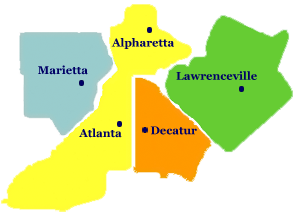Atlanta Heating & Air Conditioning Energy Savings Tips
Looking for ways to conserve electricity in your home? One option is to make improvements to your current heating and cooling system, but you should also think about the efficiency of supporting equipment. It may be time to replace your system entirely, or you may benefit from adding supplementary sources to your existing heating and cooling system.
- Install heat-resistant radiator reflectors between exterior walls and the radiators.
- Bleed trapped air from hot-water radiators one or two times seasonally; when in doubt, call a professional to complete this service.
- Clean warm-air registers, baseboard heaters, and radiators as necessary, making sure they aren’t obstructed by furniture, carpeting, or curtains.
- Clean or replace furnace filters monthly or as needed.
- Use fans for a wind chill effect to bring comfort to your home in the summer. If you use air conditioning, a ceiling fan can allow you to raise the thermostat setting about 4°F without lessening comfort levels.
- Retain warm air by turning off kitchen, bath and other ventilating fans no longer than 20 minutes after you’re finished cooking or bathing. Use a programmable thermostat to change the temperature based on your schedule.
- Slash your energy costs by up to 30% by using ENERGY STAR®-labeled products including heating and cooling systems, appliances, lighting, windows, office equipment and home electronics. Visit www.energystar.gov to find retailers near you.
- Properly insulate your hot water heater and hot water pipes to avoid loss of heat.
- Ensure that the heating ducts in unheated areas like attics and crawlspaces are properly insulated, and maintain their good condition to avoid heat loss of up to 60% at the registers.
- The cost of heating a home can account for nearly 50% of the average family’s winter energy bill. Be sure your furnace or heat pump receives professional maintenance annually and look for the ENERGY STAR® sticker when replacing your system.
On average, a home’s annual energy cost is $1,900. You can keep your electricity bills below the norm and help save the environment at the same time.
Be a speedy chef:
- The most energy-efficient way to cook is by using your microwave. It uses 2/3 less energy than your stove.
Push a button to wash your dishes:
- Surprise! Hand-washing dishes uses more water than your dishwasher. Conserve even more H20 by letting dishes air dry.
Fill up the fridge:
- Your refrigerator can stay cool more easily when it’s filled with a lot of food. A stocked fridge doesn’t warm up as quickly when the door is open.
Consume less energy and save cash by cutting back on unnecessary energy use. Here are some energy-saving tips you can use at home at zero cost to you.
Turn up the temperature:
Program your thermostat to 78 degrees when you are home and 85 degrees or off when you are away. Use ceiling or room fans to cool the room, allowing you to set the thermostat higher. Be sure to account for health considerations and get plenty to drink when the weather is warm. (Save: 1% – 3% per degree, for each degree the thermostat is set above 72 degrees)
Use your appliances wisely:
Don’t run your appliances during peak hours to help avoid electricity outages. Peak hours run from 4 p.m. to 6 p.m. — or any time an electricity emergency is declared.
- Pay attention to the warm or cold water setting to make doing laundry an efficient chore. Using cold water to rinse clothes will save 4%.
- Dry clothes on the line when possible and save up to 5%.
- Only run your dryer when you have a full load, and use the moisture-sensing setting and empty the lint trap after each use to save 0.5%.
- Only run your dishwasher when you have a full load, and opt to air-dry the dishes by shutting off the dry cycle to save1%.








